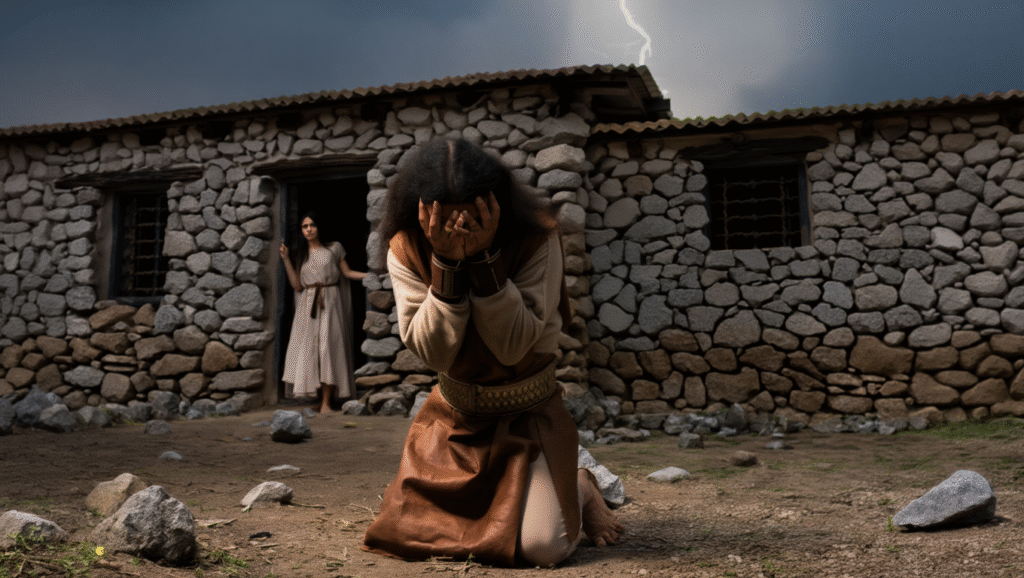“Jephthah made a vow to the Lord, saying, ‘If you will hand the Ammonites over to me, then whatever comes out of my house to greet me when I return in peace shall be dedicated to the Lord, and I will offer it as a burnt offering.'” (Judges 11:30-31 NLT)
Jephthah, a man scorned and abandoned by his own family, was forced to carve out a hard life apart from them. The locals wanted little to do with Gilead’s bastard son. His very existence was a daily reminder of Gilead’s shame. But he fit with the outcasts—those other men whose hard lives, regrets and failures had bound them together.
Then, in a peculiar twist of irony, the Lord lifted him from exile when Israel’s back was to the wall. When the Ammonites threatened, no one had the courage to face them.
Desperation caused Israel’s elders to seek out the one they’d snubbed. They begged for his help with the same breath they used to spit whenever they spoke his name. Now, Jephthah agreed, perhaps because he still ached to belong. Or maybe out of spite — or to show them what they had thrown away. But his agreement would be on his terms, not theirs.

A Desperate, Foolish, Rash Promise
And this is where the story turns so tragic. Looking over a valley filled with the haze of enemy cookfires, Jephthah struck a bargain with God. He caved to his fear and uncertainty. ‘”f you will hand the Ammonites over to me, then whatever comes out of my house to greet me when I return in peace shall be dedicated to the Lord, and I will offer it as a burnt offering.” This desperate, foolish, rash promise was likely shaped by the emptiness of a man who felt he had no resources – nothing to lose. And it proved to be his undoing.

The battle was swift and brutal, but Israel prevailed. Jephthah led his army of outcasts and undesirables to an improbable victory. He became a legend—and the ruler of Israel.
Returning home, he entered the village with his head held high. His eyes panned his neighbors for recognition. And then he saw her. His daughter—the only child of his late-born hope—burst from the house. She had her tambourine in her hand, her circle of friends dancing behind her. She was life and laughter and music in motion, filled with promise and possibility.
A Rash Promise Killed His daughter
The moment he saw her, whatever comes out of my house to meet me when I return, the words of his vow struck him like a blow. He tore his clothes, fell to his knees, and wept.
The vow echoed in the silent space between them, cruel and inescapable. “I have killed you, and it has destroyed me,” he whispered. “For I have made a vow to the Lord that I cannot take back.”
Through tears and trembling courage, his daughter told him to do as he must. But first, she asked for two months to mourn—her future, her hope, the life, the children, and the husband she would never have.

I read that account this morning. Sipping my coffee, with my Bible open to Judges 10–11, I saw myself in Jephthah’s bargain. Not in the scale or the stakes, but in the tendency to hedge when life feels overwhelming and I can’t see a way out.
“Please, God—if You fix this, I’ll do better. I’ll be better. I’ll go to church every Sunday. I’ll stop yelling at other drivers. I’ll have a “quiet time” every day. I’ll call my parents, my sister, and my children more often. I’ll share the Gospel at least once a week. I’ll give more of both my time and my money.”
In those moments, I meant every word. My promises rolled out so easily, as if oaths could purchase outcomes. Sometimes, when things worked out, I kept them for a week or two. But most of the time, like Jephthah, I found myself making new bargains before the old ones had even expired.
Now, in my seventies, I don’t make so many bargains. Not because life became easier, but because I’ve learned that God isn’t a heavenly vending machine. His heart is for the person, not their performance. Over time I came to see that the only thing God really wanted from me was… me. Flawed, inconsistent, occasionally brilliant, generally ordinary—but always, simply me.
And my thoughts returned to Jephthah’s daughter. The emptiness, the pain, and the regret born from a vow he could not revoke. He wanted more, but left a legacy of bargaining that ended in heartbreak. I want my legacy to be different—a legacy of simple, stubborn, unconditional love.
I closed my Bible and set it on the table. Then I reached for my phone and called my daughter, and then my son, just to hear their voices. The lesson of Jephthah lingered, but it did not haunt. It warned, it grieved, and it also healed.
Jephthah’s story is not the end of faith—it is a cautionary signpost pointing to something far brighter.
Abba, forgive me for the times I’ve approached You like Jephthah—trying to bargain instead of simply believing. Teach me to be reckless in abandoning myself to You, rather than trying to manipulate You or my circumstances with empty promises. Help me speak with wisdom, remembering that You are already working for my good and Your glory. Amen.
